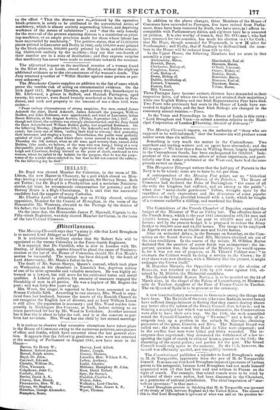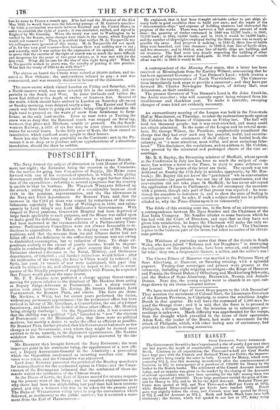faistellantous.
The Morning Chronicle says that "a story it rife that Lord Brougham is to succeed Lord Abinger as Chief Barou."
It is understood in military circles that Sir Robert Sale will be appointed to the vacant Coloneley in the Forty-fourth Regiment. It is reported that Dr. Candlish, who is now in London with Mr. Dunlop, of Edinburgh, aspires himself to plead the cause of Nonintru- sionism at the bar of the House of Commons, should Mr. Fox Maule's motion be successful. The motion has been delayed by the death of Lord Abercromby, Mr. Maule's father-in-law.
The death of Mr. Sutton Sharpe, Queen's counsel, which took place on Wednesday, at his chambers in Lincoln's Inn, deprives society of one of its most agreeable and valuable members. He was highly es- teemed as a lawyer, but still more for his cultivated tastes and social qualities. A Liberal in polities, his amenity of manners engaged the friendship of men in all parties. He was a nephew of Mr. Rogers the poet ; and was forty-five 3 ears of age. Mrs. Wood, the singer, is reported to have been converted to the Roman Catholic faith. According to one account, Mrs. Wood is sepa- rated from her husband, because the tenets of the Romish Church do not recognize the English law of divorce, and as Lord William Lenox is still alive the separation is necessary ; and Mrs. Wood resides tem- porarily in Micklegate Bar Convent, at York, before retiring to an estate purchased for her by Mr. Wood in Yorkshire. Another account has it that she is about to take the veil, and is at the convent to per- form her noviciate. Mrs. Wood has one child by her second marriage
It is curious to observe what extensive alterations have taken place in the House of Commons owing to the numerous petitions, acceptances of office, and deaths, which have occurred since the last general elec- tion. It appears that the following gentlemen, who were not returned at the meeting of Parliament in August 1841, now have seats in the House— Barron, Sir Henry W., Hervey, Lord Alfred,
Bateson, Robert junior, Hume, Joseph, Bernal, Ralph senior, Hussey, Thomas,
Boyd, Dr. John, Laseelles, Hon. William S. S.,
Cardwell, Edward, Lefroy, Anthony, Christie, William D., Leslie, Charles, Clive, Viscount, Mildmay, Humphrey St. John, Colcmhoun, John C., Ross, David Robert, Corbally, Elias, Spry, Sir Samuel, Davies, David A. S., Standish, Charles S.,
Fitzroy, Hon. Henry, Walter, John,
Fitztnaurice, Hon. W. E., Wellesley, Lord Charles, Glynne, Sir Stephen, Wortle3 Hon. James A. S.,
Hamilton, George Alexander, Wyse, Thomas.
Hampden; Reno,
In addition to the above changes, three Members of the House cf Commons have succeeded to Peerages, five have retired from Parlia- ment, three have been removed by death, two have accel tel 1 offices in- compatible with Parliamentary duties, and eighteen have be to unseated on petition. It is also worthy of remark, that Mr. O'Cc Duel, who had been returned for two counties, has made his election to s't for Cork ; that Mr. Hope, though unseated for Weymouth, is new M :tuber for Southampton ; and finally, that if Sudbury be disfranchised, the num- bers in the House will be reduced from 658 to 656.
In the Upper House, the following Members had no seats in that assembly a year ago-
Abercromby, Baron, Macclesfield, Earl of,
Berwick, Baron, Manners, Baron,
Chichester, Bishop of, O'Neill, Viscount,
Congleton, Baron, Ossory, Bishop of, Cork, Bishop of, Rodney, Baron,
Down, Bishop of, Rossmore, Baron,
Dublin, Archbishop of, Shannon, Earl of, Ferrard, Viscount, Teynham, Baron, Ferrers, Earl, Vivian, Baron, Hill, Viscount, Three Peerages have become extinct, thirteen have descended to their respective heirs, (of whom two have not yet attained their majorities,) while one English Bishop and one Irish Representative Peer have died. Two Peers who previously had seats in the House of Lords have suc- ceeded to higher titles, and the four Irish Bishops are changed in the customary annual rotation.—Times.
In the Votes and Proceedings in the House of Lords is this entry : " Lord Brougham and Vaux—to submit a motion relative to the Muni- cipal Corporation of London,rhursday, thirtieth of February!"
The Morning Chronicle reports, on the authority of "those who are supposed to be well-informed," that the Income-tax will produce a sum nearer seven than six millions.
Something is very much the matter in the Customhouse. Two searchers and landing-waiters and an agent have absconded ; and the Globe says—" We hear that a firm in Watling Street, largely implicated in the Customhouse frauds, has been exchequered for 160,000/. Inde- pendent of this enormous sum, others of minor importance, and parti- cularly one firm rather celebrated at the West-end, have had the same process served on them."
The Hampshire Telegraph notices that the half-pay of Pursers in the Navy is to be raised ; some are to have 8s. 6d. per diem.
A correspondent of the Morning Post points out an " historical parallel," citing Clarendon's History of the Rebcllien. The House of Commons had declared the Duke of Buckingham the cause of all the evils the kingdom had suffered, and an enemy to the public"; when that " melancholic gentleman " Felton, wrought upon by the repetition of such expressions and the discourses of some popular preachers in the City, provided himself with a knife, which he bought of a common cutleffor a shilling, and murdered the Duke.
The Committees of the French Chamber of Deputies examined the budget of the Minister of War on Friday last. The effective force of the French Army, which in the year 1841 amounted to 493,741 men and 110,993 horses, was reduced last year to 433,670 men and 97,448 horses ; and by the present budget it is proposed to reduce the Army further to 344,000 men and 84,288 horses. The troops to be employed in Algeria are set down at 60,000 men and 13,896 horses.
After an animated debate, in the Bureaux on Saturday, on the Com- mittee on the Secret Service Fund Bill, Ministers obtained six out of the nine candidates. In the course of the debate, M. O'Dilon Barrot declared that the question of secret funds was unimportant : the im- portant question was, the duration of the Ministry : he would oppose it, for it was not one of progress, as M. Thiers s Cabinet was: "to overturn the Cabinet would be doing a service to the Crown ; for if ever there were new elections, with a Ministry like the present, it might endanger the Crown itself."
M. Donatien Marquis, the Opposition candidate at the election of Beauvais, was returned on the 15th by 2.39 votes against 166, ob- tained by M. Didelot, the Ministerial candidate. The Spanish General Ramon Narvat.z is to be married on the 2d of March next, in the chapel of the Palace of Luxembourg, to Mademoi- selle de Tascher, daughter of the Peer of France Count de Tascber. The ex-Queen of Spain is to be present at the ceremony.
A new insurrectionary movement in Geneva is among the things that have been. The Radicals of the town (like some Radicals nearer home) have suffered disappointment at finding that they cannot destroy abuses any better after the reform of the Grand Council than before it ; and in framing a municipal law which was under discussion, the Conservatives were able to have their own way. On the 13th, the mob assembled round the Council-Chamber, crying "'To arms!" and a body of in- surgents took up a position in the suburb St. Cereals; obtaining possession of the gates, Conavin and Rice. The National Guard was called out; the rebels round the Hotel de Vilee were dispersed ; and in the conflict four men were killed and thirty wounded. The in- surgents then negotiated: they demanded the withdrawal of a law re- specting the right of search in citizens' houses, passed on the 13th; the disarming of the secret police ; and pardon for the past. The Grand Council would only agree to the amnesty. By the 15:b, however, the tumult was effectually quelled, and tranquillity restored.
The Constitutionnel publishes a rejoinder to Lord Brougham's reply to M. de Tocqueville, apparently from the pen of M. de Tocqueville himself. It makes out that Lord Brougham imputed ignorance of various points to his antagonist, because Lord Brougham had not made himself acquainted with all that had been said and written in France on the right of search. For example, that seized vessels were to be tried by a tribunal of their own nation, had been discussed in the Chambers, as a guarantee of national jurisdiction. The chief imputation of "mar- vellous ignorance" is thus met- " Lord Brougham persists in thinking that M. de Tocqueville was ignorant of the treaty of 1824, between England and the United States. The reason of this is, that Lord Brougham is ignorant of what was said on the question he- fore he tame to France a month ago. Him had read the Moniteur of the 21st May 1842, he would have seen the following passage of M. Guizot's speech- • In 1824, a convention was made between England and the United States, in order to establish the right of search ; it was concluded, ratified, and signed in England by Mr. Canning. When the treaty was sent to Washington to be ratified by the Senate, some changes were made in the treaty, which England would not consent to.' Thus, it is evident that neither M. de Tocqueville nor his colleagues were ignorant of this treaty. M. de Tocqueville did not speak of it, for two very good reasons—first, because there was nothing new to say ; and secondly, that it was useless for the expression of his opinion. He wished to prove that the exercise of the right of search was so much the more difficult and dangerous for the peace of two great nations, as it was met with for the first time. What did he care for the idea of this right being old ? What M. de Tocqueville wished to prove was, the novelty of putting it into practice. What had the treaty of 1824 to do with this ? "
The slaves on board the Creole were valued at 20,000 dollars, and in- sured at New Orleans : the underwriters refused to pay ; a suit was commenced, and was recently decided in favour of the claimants.
The snow-storm which visited London on Friday and Saturday, with a North-eastern wind, was more severely felt in the country, and es- pecially to the South and West. In some lowlands and vallies the snow had drifted to the depth of twelve or fourteen feet. Several of the mails, which should have arrived in London on Saturday aft:rnoon or Sunday morning, were delayed nearly a day. The Exeter and Yeovil coach was three hours in going six miles ; being obliged to abandon the high-road to proceed on the waste of snow from farmhouse to farm- house, as the only land-marks. Even so near town as Tooting the snow was so deep that the Banstead coach was stopped on Saturday, between that place and Mitcham, unable to proceed. On the South- western Railway, a drift of six feet deep in some places detained the trains for several hours. In the hilly parts of Kent, the thaw caused an inundation, which confined many people to their houses. Snow has also fallen very generally on the Continent ; and in the Py- renees it is so deep as to produce serious apprehensions of a disastrous inundation, should the thaw be sudden.



























 Previous page
Previous page